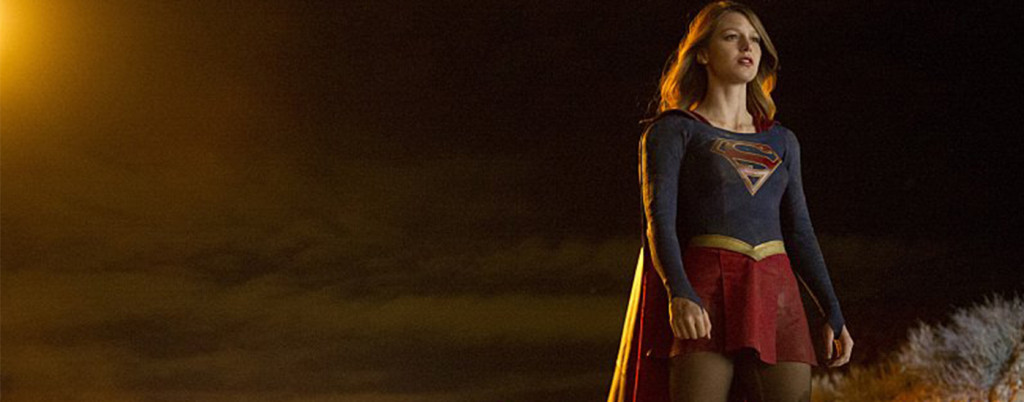It doesn’t mean “less than.” It doesn’t mean “weak.” In fact, it means more than anything else on TV right now.
Supergirl is CBS’s new flashy superheroine show, which premiered last week to cautiously optimistic reviews. It’s smart, slick and seems on track to be a new success for the third network.
The pilot focuses on the coming out of Kara Zor-El, biological cousin of Krypton native Kal-El, aka Clark Kent, aka Superman. She was sent to Earth as a young teen to protect her baby cousin, but her ship was thrown off course and she was stuck in time until after Superman was an adult. Since he no longer needed her protection, she lived a relatively normal life with her adoptive family, the Danvers. (In a fun cameo for lovers of casting Easter eggs, Kara’s Earth parents are played by Dean Cain, of Lois & Clark fame, and Helen Slater, who played Kara in the 1984 British flop film, Supergirl.)
All of this exposition is pushed through the first five minutes like frosting through a piping bag. It comes at you fast and matter-of-fact, with no qualms about its lack of subtlety. Usually, this kind of hammered exposition drives me nuts. Here, somehow, it works. The origin story is inevitable, so better to get it out of the way and move on with the story. And that’s exactly what the writers — veterans Greg Berlanti (Arrow, The Flash, Everwood, Jack & Bobby), Ali Adler (The New Normal, Glee, Chuck) and Andrew Kreisberg (Arrow, The Flash, Boston Legal) — do. When the premise is set, an expert pace sets in. Subtlety, on the other hand, never shows its face.
At age 24, when we find her, Kara — played by Glee‘s Melissa Benoist, a relative newcomer with a husky laugh and a disarming “aw shucks” demeanor — is working as a coffee-fetching, abuse-bearing assistant to a powerful newspaper editor, Cat Grant, played by the fabulous Calista Flockhart, who is just the right mix of nasty and inspiring, reminiscent of Meryl Streep in The Devil Wears Prada. They live and work in a secondary city. If Superman’s Metropolis is New York, National City is Boston. Tired of living at Cat’s beck and call, Kara wants to reveal her identity and do some real hero stuff. When her Earthling sister Alex (welcome back to TV, Chyler Leigh!) is on a plane about to crash, her moment arrives.
The best part about Supergirl is the way it embraces its own lack of subtlety. Why deny it? The Supergirl premise comes laden with an inescapable feminism: a young female heroine with no physical limitations and supernatural senses, strength, and bravery, who wants to save the world. Supergirl‘s writers embrace their subject, squeezing every drop of evangelism from it without apology.
First, the name, Supergirl, is discussed in earnest. “We can’t call her that!” Kara protests when Cat coins the moniker. The word “girl,” Kara argues, implies that she’s “less than what she is.”
Feminists have long decried the term “girl” for anyone over the age of 16 or so, rejecting its diminutive implications and arguing that it is used to infantilize grown women. And indeed, it has been used as such in board rooms and bars everywhere, for as long as there have been co-ed bars and board rooms. But in one sweeping statement, Cat lays out the case for reclaiming it with a meaning much more powerful.
“What do you think is so bad about ‘girl?'” she asks. “I’m a girl. And your boss. And powerful. And rich. And hot. And smart. So, if you perceive Supergirl as anything less than excellent, isn’t the real problem … you?”
Boom.
In an even more in-your-face statement, a diner waitress comments on the refreshing nature of having a female hero in her city. “It’s nice for my daughter to have someone like that to look up to,” she said.
After years — nay, decades — of begging for woman-centered stories that that explore more than the familiar tropes of motherhood and romance, suddenly it seems like they are everywhere. The ShondaLand franchise, Agent Carter, iZombie, Supergirl, Jane the Virgin, the Unbreakable Kimmy Schmidt, Orphan Black, Quantico, Broad City, The Comeback, Outlander, Being Mary Jane, Homeland, and Mom are all shows that have premiered in the last five years that tell a woman’s — or women’s — unique story(ies) from a woman’s point of view. Not to mention they have all been wildly successful among men and women alike. Looking back on shows that premiered in the early 2000s and earlier, that’s harder to find. Of course, the majority of current hit series are still mostly or entirely male-focused. When you look at the numbers, it’s still not pretty.
But the upswing we’ve seen in the last few years is heartening, as is the increased attention given to diversity of all kinds in Hollywood. As Kara said when she makes her first mistake, and someone suggests she give up: “I’m still learning.”
We’re still learning. Up, up and away!



